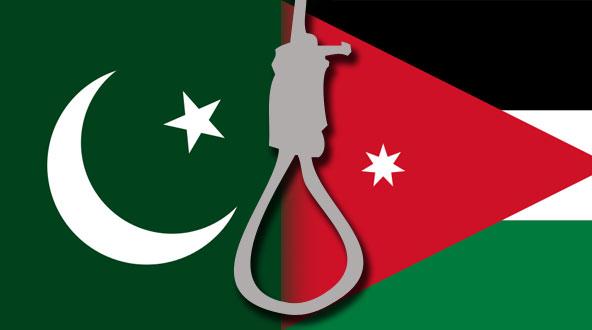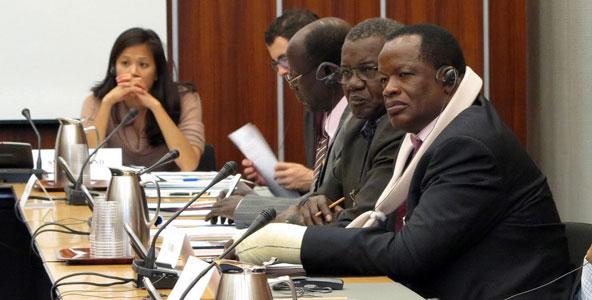
Why Jordan resumed executing people on the death row?
Asia
The War on Terrorism
‘The country’s current importance in the region amid the war on the Islamic State makes it more confident of implementing such a penalty’ (Oddone 2015).
In 2005, following international pressures with regards to the human rights’ conditions in the Jordanian Kingdom and the continuation of the executions in a large number of crimes, King Abdullah announced that ‘Jordan “could soon become the first country in the Middle East without capital punishment.”’ In 2006, the UN Human Rights Council protested the wide scale of crimes deemed punishable by death in the Jordanian Laws. In response, in 2007, the King announced that executions would be on hold until further notice.
The dependency of the Kingdom on the economic aid and the political support from the US and the EU countries has driven its anti-death penalty policy in the mid-2000s, with promises for bilateral treaties for the exchange of criminals and special facilities for Jordanians entering the EU. However, it appears that, following the soaring in the terrorist activities with the expansion of ISIS, Jordan was granted a new place in the international arena as an ally in the war on terrorism.
The resumption of the death penalty was feared in the past amid worries that the international aid might be conditional on making progress in Jordan’s human rights conditions and taking steps towards the abolishment of the death penalty. However, as Jordan entered the war on terrorism, it became more confident that resuming the death penalty will not be faced with grave consequences, especially with regards to the flow of the aid to the country (El Sabagh 2014). As Oddone reports citing political analyst Oraib al-Rantawi,
Jordan faces condemnation from W estern countries [but] without pressure or conditionality regarding economic assistance or political support,” Rantawi said. “The country’s current importance in the region amid the war on the Islamic State makes it more confident of implementing such a penalty” (2015).
Deterrence & The Image of The State
‘“The aim was to send a clear message to anyone who tries to undermine the security of the country.” Executions are “the fate of all those who carry out criminal offences”’ (The Attorney General for Amman district).
With the new international circumstances that secured Jordan’s economic aid from human rights’ pressures, coupled with the survival of the Kingdom from the drastic political changes that accompanied the 2011 uprisings without a radical change of the regime, the death penalty was a tempting policy to adopt in advancement of the state’s image as strong and secure. Thus, in the face of the internal political pressures on the government’s performance economically, especially in relation to the high levels of unemployment and poverty, the Kingdom needed to boost its image and popularity by resuming the death penalty under the justification of its policy of deterring and fighting crimes and terrorism. Further, the resumption of the death penalty was a way of appeasing large segments of the population who supported the death penalty as it conforms with the traditional tribunal ideology of revenge.
The Interior Ministry announced on the morning of the executions in December 21st, 2014 that deterrence is the main aim of the restoration of the death penalty following an increase in the crime rates since the ban. Nevertheless, many commentators have expressed their objection to such a statement, arguing that the increase in the crime rates is associated with the growth of the population ‘from six million to more than nine in less than five years (which) must be a factor accounting for the increasing of criminality.’
Over the following years, what started as executing people for the purpose of deterring crimes of murder and rape, turned into a revenge policy for the terrorism crimes committed against Jordanians. In 2015, Jordan executed Sajida Al Rashawi who was involved in the 2005 Amman Bombings and Karboli who was a member of Al-Qaeda and convicted of killing a Jordanian national, in revenge for the burning alive of Jordanian pilot Moaz al-Kasasbeh. In 2017, further 15 people were executed, 10 of whom were convicted for terrorism-related offences. Reports have indicated that the choice of the offenders to be executed was not random, rather, the executed individuals were particularly known for well-publicized crimes that occupied the public opinion in Jordan for a long time, in a further emphasis on increasing the legitimacy and the image of the state as strong and tough on crimes.
An assessment of the resumption of the death penalty after three years now shows that the penalty did not show any sign of success. With relation to the deterrence of the crimes of murder and rape which are punishable by death in the Jordanian laws, there has been no evidence showing a reduction in the crimes’ rates or an enhancement of the security conditions as a result of the application of the death penalty. In relation to the deterrence of terrorism-related crimes, the terrorist attacks continued during the years 2015 and 2016, as Sánchez reported.
In November 2015 an attack took place in Muwaqqar against the military that killed 6; in March 2016 the Irbid cell was disrupted; in June 2016 the attack on Baqa’a refugee camp GID office; the assassination of the writer Nahed Hattar in September 2016, and the attack in Karak in December 2016, together with several attacks by extremist groups on the Syrian border against the Jordanian military.
In conclusion, Jordan’s resumption of the death penalty seems to be a classic case of a choice of facing violence with violence. Instead of directing the state’s efforts towards the eradication of the economic and social problems that drive the high crimes rates, raising awareness against the traditional tribal ideology of revenge, and fighting the extremist ideology of ISIS, Jordan has chosen to kill the offenders in a move aspiring for a deterrence that has proven to be unsuccessful. As Kuttab advances ‘much more serious political, social and economic reform is needed to lower the rates of crime and terror.’ One can hope, that given the lack of the success of the death penalty in achieving any of the announced aims of the Kingdom that it would reconsider its stance and move towards the abolishment of the death penalty. However, such hope seems minimal as the prevalent voice of violence and the war on terrorism continues to govern the scene.
Hend Hanafy is a PhD Candidate, Faculty of Law University of Cambridge.
Categories
Jordan






